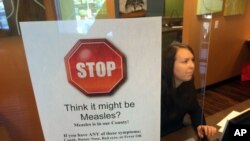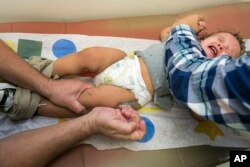Measles is more serious than commonly thought, according to new research.
A deadly neurological disorder called subacute sclerosing panencephalitis, or SSPE, can strike children years after they've recovered from measles, and researchers report that the secondary condition affects more children than previously believed.
It was thought that SSPE occurred in one in 100,000 people who contracted the childhood illness. The latest data — announced at IDWeek, the annual professional meeting of infectious disease organizations — put the risk of SSPE at 1 in 600.
The measles vaccine, which also targets mumps and rubella, is usually administered in babies between 12 and 15 months of age. The MMR vaccine generally is not recommended before a child's first birthday, because experts say babies still retain some of their mother's antibodies, making the vaccine less effective. Infants who contract the illness before they are vaccinated are at highest risk for SSPE.
Measles causes a sore throat, runny nose, cough and distinctive rash. The body usually clears itself of the virus in two weeks, but in some children, the virus can lay dormant in the brain for years. Researchers do not know why the virus can suddenly spring to life with lethal consequences.
SSPE can cause memory loss, mood changes, involuntary muscle jerking and spasms, blindness and death.
Lead researcher James Cherry of UCLA's David Geffen School of Medicine said measles could be eliminated worldwide if 95 percent of children got the two-dose vaccine.
Measles was declared eliminated in the U.S. in 2000. However, in recent years, some parents in the United States have refused to vaccinate their children, worried that the measles vaccine can cause autism, a neurodevelopmental disorder.
Since 2014, 667 measles cases have been diagnosed, according to the U.S. Centers for Disease Control and Prevention. Last year, 131 cases of measles were linked to exposure to unvaccinated children at Disneyland in California. Experts at the state's Department of Health said two dozen of the Disneyland cases affected children under two years of age, putting them at risk for SSPE later in life.





